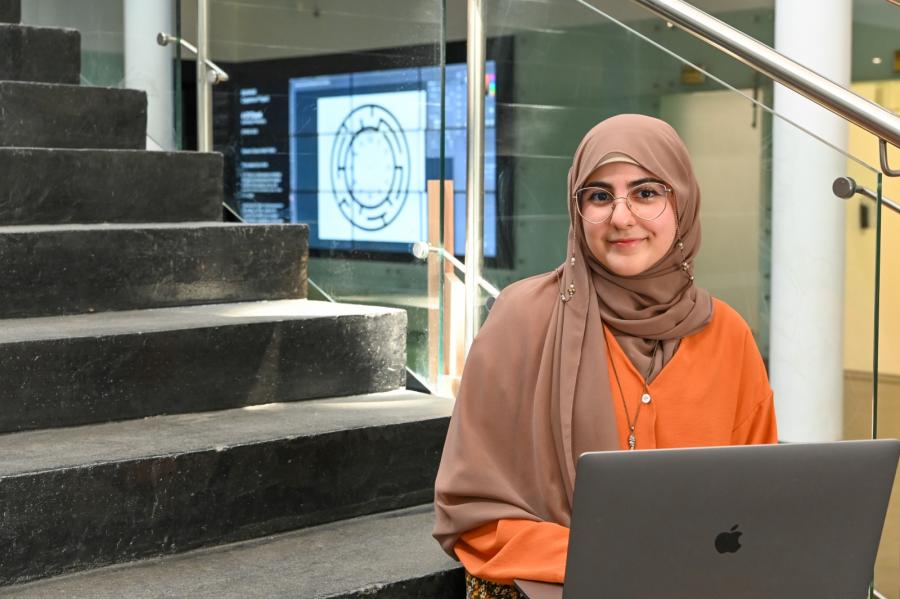- About
- Admissions
- Study at AUS
- Prospective Students
- Bachelor's Degrees
- Master's Degrees
- Doctoral Degrees
- Admission Publications
- International Students
- Contact Admissions
- Grants and Scholarships
- Sponsorship Liaison Services
- Testing Center
- New Undergraduate Student Guide
- New Graduate Student Guide
- File Completion
- New Student Orientation
- Payment Guide
- Executive Education
- Students with Disabilities
- Academics
- Life at AUS
- Research
- Contact Us
- Apply Now
- .

AUS student wins regional acclaim for gamifying philosophy
“As sands through the hourglass, so are the games of our lives.”
Multimedia student Tasneem Abdelfattah from American University of Sharjah has been named Regional Winner of the Global Undergraduate Awards–Visual Arts category for turning an existential conversation about time into a computer game. 4 O’Clock is a first-person narrative 3D game that discusses the speed at which time passes, and presents topics including work, time and death.
Inspired by existential philosophy—a form of inquiry that explores the problem of human existence and centers on the experience of thinking, feeling and acting—as well as the psychology behind puzzles, the game is introduced through multiple chambers, each providing a “way of living” that the player will consider, analyze and critique. Led by their higher consciousness, the player explores the terrains of life while considering philosophical questions on time and how it is spent.
“Stories about people feeling that they’re wasting their lives are all too common. We often make decisions that are dictated by fear and our comfort zone, but we must be fully aware and mindful of our decisions. This video game experience prompts the audience to make more conscious decisions while considering their finite lives and the limited time they have. Will we ultimately take the reins on the ticking clock?,” said Abdelfattah.
“I had not seen philosophy being gamified before, and with the increasing significance of video games as a learning force, I believed it was important to spread this field of ideas to a wide audience. I often find myself making projects that heavily discuss existential philosophy and the way we live our lives. I think it’s crucial to critically examine how we’re living if we wish to reach satisfaction in life,” she said.
The Palestinian student completed the game, from conceptualization to game coding, as part of her individual capstone project at AUS’ College of Architecture, Art and Design (CAAD), under the supervision of adjunct professor Leah Manasseh.
“I started this project with no experience in creating games or coding, so I was learning the ins and outs of game design while simultaneously working on the assets and content of the project,” said Abdelfattah.
“I enjoy using playful and somewhat humorous elements to present more serious topics such as philosophy and death. I believe that absurd humor is an exceptional tool for effectively communicating ideas while entertaining the audience, and in this project, I utilize such humor to present a philosophically and intellectually stimulating narrative. I’m thrilled the judges of the Undergraduate Awards enjoyed it, too,” she said.
Founded in Dublin, Ireland, the Global Undergraduate Awards is the world’s leading undergraduate academic awards program. It recognizes top undergraduate work and connects students across cultures and disciplines.
Other AUS students who received a Highly Commended award for their work include Marina Abdelmessih and Sahil Rattha Singh from CAAD; Mohammed Abdul Salam and Dana Malouf from the College of Arts and Sciences; Asith Farhan, Sabbir Alam, Joel D’Souza and Farook Mirza from the College of Engineering; and Fatima Farzana from the School of Business Administration.
For more information about research by students and faculty at American University of Sharjah, visit w.aus.edu.

